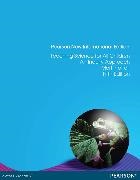Share
Fr. 81.90
Teresa Franklin, Jack Gerlovich, Ralph Martin, Dennis McElroy, Colleen Sexton
Teaching Science for All Children: An Inquiry Approach
English · Paperback / Softback
Shipping usually within 3 to 5 weeks
Description
The Fifth Edition of this popular elementary science methods text emphasizes learning science through inquiry, implementation of the Learning Cycle, NSE standards, constructivism, technology, and strategies for teaching diverse learners.
Teaching Science for All Children employs an inquiry model throughout, especially apparent in the design of its learning cycle lesson plans. Engaging Questions, Exploration, Explanation, Expansion, and Evaluation make up the "Es” of this modern learning cycle based on the model first invented by Robert Karplus as part of the Science Curriculum Improvement Study in the 1960s. The text provides methods for future teachers to foster awareness and understanding among their students of the nature of science; to construct understandings of and connections between various science content; to encourage application of science inquiry processes in the classroom; and to develop their students' understanding of the interactions between science, technology, and society. The final sections of the book incorporate Life Science, Physical Science, and Earth and Space Science lessons as a means to convey important pedagogical content knowledge and ideas to implement in the elementary classroom.
List of contents
Preface
I.4-E Methods for Teaching Science
1. What is the Nature of Science?
How Do Children Perceive Science?
What Changes Have Occurred in Elementary Science?
The Nature of Science
Three Essential Features of Science
The Aims of Standards and Research-Based Education
2. How do Children Learn Science?
What Role Does Brain Development and Processing Play in Learning?
Where Do Children's Ideas Come From and How Do They Influence Learning?
What Is the Dominant Perspective About How Children Learn Science?
What Techniques and Roles Support Constructivist Learning?
3. How Can You Improve Science Learning for Diverse Learners?
Science For All
Science for Exceptional Children
How Can Parents Help Meet Children's Special Needs?
4. How Do You Plan for the Inquiry-Based Classroom?
Using the National Science Education Standards and Promoting Inquiry.
Concept Mapping
Planning Constructive Inquiry Science Lessons
5. What Inquiry Methods Help Learners to Construct Understanding?
What is Scientific Literacy?
Science as Inquiry for Literacy
Methods that Use Inquiry to Promote Student Concept Formation
Techniques for Promoting Student Cooperation
Recommendations for Enhancing Student's Learning of Science
6. How Can You Use Questions to Foster Scientific Inquiry?
Questions on Questions
What Are the Different Types of Questions?
What Are the Keys to Effective Questioning?
How Can You Improve Your Questioning?
Why Use Students' Questions
7. How Do You Develop and Use Authentic Assessment?
Evaluating Student Learning
Selecting the Tool for the Task.
8. How Does Technology Enrich Scientific Inquiry?
Why Use Educational Technology?
How Can Educational Technology Be Applied in the Context of Science Teaching?
What Is Integration?
9. How Do You Plan for and Integrate Science with Other Disciplines?
Approaches to Integration
Challenges to Integration
10. How Can You Design and Manage a Safe Inquiry-Based Science Classroom?
Recommendations for Safe Science Experiences
How Do You Plan for Safety?
What Are Your Legal Responsibilities?
Safety Equipment
Performing Safety Assessments
What Materials are Necessary for the Activities?
Storage
Room Arrangement
A Final Thought
11. What Materials and Resources Promote Inquiry-Based Science?
Lessons Learned
Selecting and Using Textbooks
Best Practices
Resources for Best Practices
II. 4-E Inquiry Lessons for Teaching Science
Life Science Lessons and Activities
Physical Science Lessons and Activities
Earth and Space Science Activities
Appendix: National Science Education Standards: Contents Standards for Grades K-4 and 5-8.
References
Index
Summary
The Fifth Edition of this popular elementary science methods text emphasizes learning science through inquiry, implementation of the Learning Cycle, NSE standards, constructivism, technology, and strategies for teaching diverse learners.
Teaching Science for All Children employs an inquiry model throughout, especially apparent in the design of its learning cycle lesson plans. Engaging Questions, Exploration, Explanation, Expansion, and Evaluation make up the “Es” of this modern learning cycle based on the model first invented by Robert Karplus as part of the Science Curriculum Improvement Study in the 1960s. The text provides methods for future teachers to foster awareness and understanding among their students of the nature of science; to construct understandings of and connections between various science content; to encourage application of science inquiry processes in the classroom; and to develop their students’ understanding of the interactions between science, technology, and society. The final sections of the book incorporate Life Science, Physical Science, and Earth and Space Science lessons as a means to convey important pedagogical content knowledge and ideas to implement in the elementary classroom.
Product details
| Authors | Teresa Franklin, Jack Gerlovich, Ralph Martin, Dennis McElroy, Colleen Sexton |
| Publisher | Pearson Academic |
| Languages | English |
| Product format | Paperback / Softback |
| Released | 03.06.2024 |
| EAN | 9781292041803 |
| ISBN | 978-1-292-04180-3 |
| No. of pages | 580 |
| Dimensions | 217 mm x 274 mm x 21 mm |
| Weight | 1220 g |
| Series |
Pearson |
| Subject |
Education and learning
> Schoolbooks, general education schools
|
Customer reviews
No reviews have been written for this item yet. Write the first review and be helpful to other users when they decide on a purchase.
Write a review
Thumbs up or thumbs down? Write your own review.

